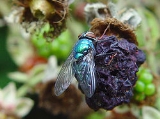
Brachycera
Encyclopedia
Brachycera is a suborder of Diptera
. It is a major suborder consisting of around 120 families
. The most distinguishing characteristic of the suborder is reduced antenna
segmentation. A summary of main physiological characteristics follows:
Brachyceran flies can also be distinguished through behavior. Many of the species are predators or scavenger
s.
) have not been used in decades, but still persist in textbooks, checklists, faunal catalogs, and other sources. Additionally, most recent classifications no longer use the Linnaean ranks for taxa (e.g., the Tree of Life Web Project
), and this creates its own set of problems. See discussion for details.
Fly
True flies are insects of the order Diptera . They possess a pair of wings on the mesothorax and a pair of halteres, derived from the hind wings, on the metathorax...
. It is a major suborder consisting of around 120 families
Family (biology)
In biological classification, family is* a taxonomic rank. Other well-known ranks are life, domain, kingdom, phylum, class, order, genus, and species, with family fitting between order and genus. As for the other well-known ranks, there is the option of an immediately lower rank, indicated by the...
. The most distinguishing characteristic of the suborder is reduced antenna
Antenna (biology)
Antennae in biology have historically been paired appendages used for sensing in arthropods. More recently, the term has also been applied to cilium structures present in most cell types of eukaryotes....
segmentation. A summary of main physiological characteristics follows:
- Reduced antennaAntenna (biology)Antennae in biology have historically been paired appendages used for sensing in arthropods. More recently, the term has also been applied to cilium structures present in most cell types of eukaryotes....
size (with 8 or fewer flagellomeres). - A maxillaryMaxillaThe maxilla is a fusion of two bones along the palatal fissure that form the upper jaw. This is similar to the mandible , which is also a fusion of two halves at the mental symphysis. Sometimes The maxilla (plural: maxillae) is a fusion of two bones along the palatal fissure that form the upper...
palp (an elongated appendage near the mouth) having 2 segments or fewer. - The back portions of the larval head capsule extend into the prothoraxProthoraxThe prothorax is the foremost of the three segments in the thorax of an insect, and bears the first pair of legs. Its principal sclerites are the pronotum , the prosternum , and the propleuron on each side. The prothorax never bears wings in extant insects, though some fossil groups possessed...
(the anterior part of the thorax which bears the first pair of legs). - There are two distinct parts which make up of the larval mandible (lower jaw).
- The epandrium and hypandrium of the genitalia are separated in males.
- No premandible on the lower surface of the labrumMouthpartsThe mouthparts of arthropods have evolved into a number of forms, each adapted to a different style or mode of feeding. Most mouthparts represent modified, paired appendages, which in ancestral forms would have appeared more like legs than mouthparts. In general, arthropods have mouthparts for...
(the roof of the mouth). - A distinct configuration of the CuA2 and A1 wingWingA wing is an appendage with a surface that produces lift for flight or propulsion through the atmosphere, or through another gaseous or liquid fluid...
veins.
Brachyceran flies can also be distinguished through behavior. Many of the species are predators or scavenger
Scavenger
Scavenging is both a carnivorous and herbivorous feeding behavior in which individual scavengers search out dead animal and dead plant biomass on which to feed. The eating of carrion from the same species is referred to as cannibalism. Scavengers play an important role in the ecosystem by...
s.
Classification
The structures of subgroups within the Brachycera is a source of much confusion and controversy; many of the names used historically (e.g. OrthorrhaphaOrthorrhapha
Orthorrhapha is a circumscriptional name which historically was used for an infraorder of Brachycera, one of the two suborders into which the order Diptera, the flies, are divided. As the group was paraphyletic, it has not been used in classifications in the last decade, and is effectively...
) have not been used in decades, but still persist in textbooks, checklists, faunal catalogs, and other sources. Additionally, most recent classifications no longer use the Linnaean ranks for taxa (e.g., the Tree of Life Web Project
Tree of Life Web Project
The Tree of Life Web Project is an ongoing Internet project providing information about the diversity and phylogeny of life on Earth. This collaborative peer reviewed project began in 1995, and is written by biologists from around the world....
), and this creates its own set of problems. See discussion for details.

